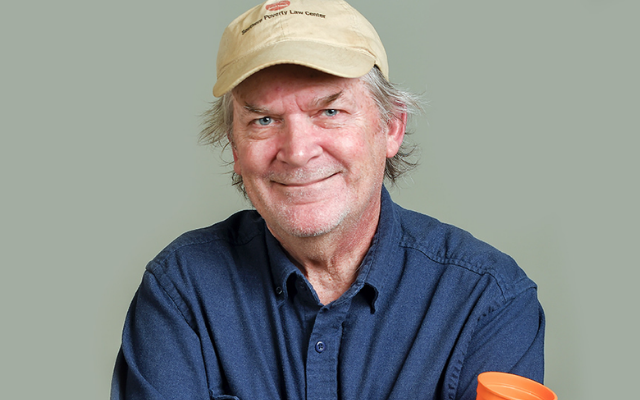Author Spotlight & Interview with George Singleton

Porchlight is pleased to feature George Singleton in our Author Spotlight segment, and to publish a new story of his, “Why I Quit Caring,” for subscribers.
We asked George if he would take time to answer a few questions about himself and his craft, and his response was a quick yes. We hope you enjoy this glimpse into the writing life of one of the South’s most interesting and relented artists—and subscribe to read his new short story.
~~~~~~~~~~
If you had to pick one factor that is catalyst for what you write, what would it be?
I can give you the catalyst for why I write: I always want the next story to be better than the last. Randall Jarrell mentioned the chances of writing a perfect poem are about the same as having a meteor land in your lap while one sits in the front yard. I’m trying, always, to have that meteor land. As to what I write—I don’t really think about it, but I guess I want people to laugh and cry simultaneously. It’s nearly impossible. Well, maybe not cry, but at least stay to themselves, “Uh-oh, should I have been laughing earlier?…"
Almost a quarter century has passed since These People Are Us. Are you a better writer now, and if so, in what ways?
I think I’ve veered from slapstick. Slapstick is funny in the movies, but on paper it’s not always viable. “Moe hit Curly with a frying pan. Larry stabbed Moe in the eyes. Curly slapped his own face over and over…” I like watching The Three Stooges, but on paper it ain’t all that humorous.
Mark Twain said, "The humorous writer professes to awaken and direct your love, your pity, your kindness--your scorn for untruth, pretension, imposture...He takes upon himself to be the week-day preacher." Do you see yourself in that role as a humorist and satirist?’
Humorist, probably. I might be wrong on this, but I see satire as making fun of institutions, kind of like how Swift’s “A Modest Proposal” aims at the British government. I kind of live by Beckett’s notion that there’s nothing funnier than human misery. I want people to read my work and go, “My life stinks right now, but at least I’m not going through what this Singleton character goes through."
For you, is there a difference between humor and satire as you write?
See above. I really don’t intend on satire, as I see it. I guess I might have a character who casts a wary eye toward politicians or college administrators.
When you’re writing, do the jokes come first and the story follows, or do you find the humor sneaks in as you write?
I think when I first started writing, in my twenties, I’d sit around, think up a joke, then try to write an entire story that stemmed from that joke. Nowadays—well, I don’t think my writing is all that funny anymore—the humor sneaks in, I guess.
You’ve written both short stories and novels—do you feel more at home in one form over the other, and what makes the difference for you as a writer?
I’m way more comfortable with short stories. First off, I’m a little impatient. Secondly, I get tired of hearing my own voice for 300 pages. I only wrote Novel because I tired of editors/agent/publishers goading me on. I wrote Work Shirts for Madmen because I wanted to prove I could write something better than Novel.
Do you journal or keep notes of witty lines for particular characters you plan to develop?
I keep a little memo pad in my back pocket for lines or ideas, but over the years it’s turned more into a pad for grocery lists and reminders. Don’t be surprised if I put out a short story that goes “Milk, bread, dog food, more dog food, bird seed, Vienna sausages, take your blood pressure medicine."
Do you allow the characters to tell their own story? Do they take you in unexpected directions?
My characters have free will, it seems, for better or worse. I rarely know exactly where a story’s going, or what a character might say and do. BUT: Shannon Ravenel gave me some great advice about twenty-three years ago. She said, “A good story’s ending kisses the beginning. Too many or your stories’ endings grope the beginning.” Gee, thanks for having my back, Shannon. Anyway, more than ever, if I’m 3,000 words into a story and think to myself, Where is this freaking going? I’ll go read the opening paragraph. If it started at a grocery store, somehow I’m going to end it at a grocery store, or the main character driving by a grocery stores, something like that.
Looking across your career, what themes or obsessions do you come back to, even if unintentional?
I don’t know about themes, really. As for obsessions, there seem to be a lot of dogs show up.